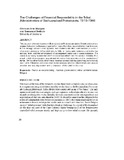| dc.contributor.author | Makgala, C.J. | |
| dc.contributor.author | Botlhale, E. | |
| dc.date.accessioned | 2011-11-22T10:05:50Z | |
| dc.date.available | 2011-11-22T10:05:50Z | |
| dc.date.issued | 2008 | |
| dc.identifier.citation | Makgala, C.J. & Botlhale, E. (2008) The challenges of financial responsibility in the tribal administration of Bechuanaland Protectorate, 1919-1966, African Historical Review, Vol. 40, No. 2, pp. 28-61 | en_US |
| dc.identifier.issn | 1753-2523 (print) 1753-2531 (online) | |
| dc.identifier.uri | http://hdl.handle.net/10311/924 | |
| dc.description.abstract | This account of tribal finances in Bechuanaland Protectorate under British colonial rule argues that while the treasury dispensation made the tribes responsible for their finances,
it also brought about a new dynamic and challenge in tribal communities as a result of a new monetary and financial system. Little or inadequate remuneration led to low morale, theft, and the employment of incompetent personnel in some instances. The
colonial authority needed the chiefs to run tribal affairs and for political stability. As a
result, chiefs often escaped unpunished whenever they were involved in peculation of
funds. On the other hand, when tribal revenue workers did the same they were harshly dealt with. Efficiency and corruption in the treasury system differed from one area to another and was dependent on the character of the chief in the area. | en_US |
| dc.language.iso | en | en_US |
| dc.publisher | Routledge (Taylor and francis), www.routledge.com | en_US |
| dc.subject | Financial responsibility | en_US |
| dc.subject | Colonial government | en_US |
| dc.subject | Tribal administration | en_US |
| dc.subject | Dikgosi | en_US |
| dc.title | The challenges of financial responsibility in the tribal administration of Bechuanaland Protectorate, 1919-1966 | en_US |
| dc.type | Published Article | en_US |
| dc.link | http://www.tandfonline.com/doi/abs/10.1080/17532520902793262 | en_US |

